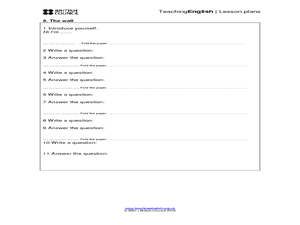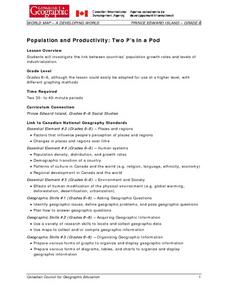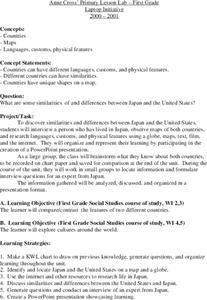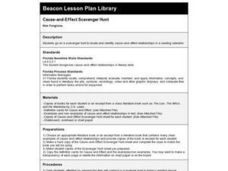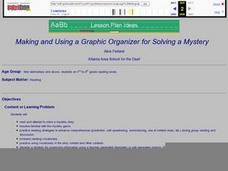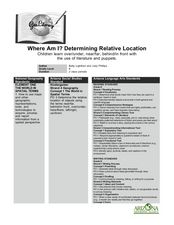Curated OER
Facebook Worksheets
In this friends worksheet, students read a text, fill out a profile, fill in the blanks to short sentences, and more. Students complete 5 activities.
Curated OER
Picture Hunt: R Control O
Young scholars use the r controlled o sound to sound out words and identify items and people in a picture. For this r controlled o lesson plan, students use the internet to complete their activity.
Curated OER
Lisa Leslie - Women's Basketball Star
Third graders read from their textbooks about Lisa Leslie, the famous American women's basketball star. They discuss the overall disparity of attention and salaries in women's sports compared to men's. They write facts and opinions...
Curated OER
Teams in the Field
Students conduct team interviews outside the classroom, either within the school or beyond, as part of a fieldwork project. They use reasoning skills as they formulate questions, plan, predict, hypothesize, and speculate about the...
Curated OER
Population and Productivity: Two P's in a Pod
Students investigate the link between countries' population growth rates and levels of industrialization. They observe that, over time, as a country becomes more industrialized, its population growth rate decreases.
Curated OER
Writing: Narrative, Expository, Persuasive, and Descriptive
If you are interested in having a basic framework for teaching expository, narrative, persuasive, and descriptive writing, this resource may help; however, you will have to find information on the different forms of writing to share with...
Curated OER
What's Wrong - Intensive Reading
There are different types of reading meant for different texts. Discuss four of these with your emerging readers. When does one perform an extensive or intensive reading? When does one skim or scan a text? How are these all different?
Curated OER
Japan
First graders investigate the similarities and differences between Japan and the United States. They develop a KWL chart, locate Japan and the U.S. on a globe, conduct Internet research on life in Japan, conduct an interview, and create...
Curated OER
Desert Views: First Impressions
Young scholars are introduced to primary source material and the ways in which early travelers viewed aspects of the desert environment. The instructional activity addresses the geography themes of location, region, and human/environment...
Curated OER
Simply Speaking
Emerging orators distinguish between effective and ineffective public speaking strategies. They read a text that fits in with a Native Americans unit and speak about the text with both ineffective and effective volume, tone, phrasing,...
Curated OER
Cause-and-Effect Scavenger Hunt
Examine and discuss examples of cause-and-effect relationships. They locate and identify cause-and-effect relationships in their current reading selection.
Virginia Department of Education
Researching and Narrowing Topics
Internet research is becoming more common, so why not conduct an online research project in your classroom? Use this resource to get you and your class started. The lesson includes basic instructions and a list of questions to help...
Curated OER
Making and Using a Graphic Organizer for Solving a Mystery
Students create tables in a word processing program which helps them organize their text clues when reading a mystery story. They develop reading comprehension strategies while using a computer based graphic organizer in order to solve...
Curated OER
Classic Columns
Sixth graders present a PowerPoint presentation on Greek columns. They realize that Greek culture is centered around religion. Students create a model of one of the columns. Also they find examples of Greek architecture in major Greek...
Curated OER
Main Idea with SENTEO Component
Students explore "main idea." In this main idea and details reading comprehension lesson plan, students view a Brain POP video about main idea and then identify sentences displayed on the SMART Board that would be included in a paragraph...
Curated OER
Romeo and Juliet: KWHL Strategy
Introduce Romeo and Juliet with a KWHL strategy that asks learners to record what they know, what they want to learn, and how they will find this information on a large chart posted in the classroom. During the reading of Shakespeare’s...
Curated OER
Where Am I? Determining Relative Location
Students use position words to describe where their teacher is sitting and read a story that makes use of position words. In this spatial lesson, students make a stick puppet and play Simon Says focusing on using position words in the...
Curated OER
The Underground Railroad and the I & M Canal in Illinois
Students, in groups, discuss the Underground Railroad, then fill out a worksheet.
Curated OER
Information Fluency Unit
Third graders pretend they have been asked to make t-shirts to show endangered plants and animals in the rainforest. Using the internet, they research what is happening in the rainforest and discover why the destruction of it is harmful...
Curated OER
Wisconsin History and Information
Fourth graders complete a multi-faceted project about the people, places, and government of Wisconsin. Working with traditional and technological resources, they research various topics related to the history of Wisconsin and create a...
Curated OER
Lesson Refresh: Plan with the END in Mind
Fourth graders identify literary techniques by participating in a class discussion. In this organization lesson, 4th graders practice public speaking while presenting ideas for a story to their classmates as well as critiquing the ideas...
Curated OER
Social Studies- Guessing Game
Students research a place of interest. In this guessing game lesson plan, students look up information on a place they want to learn more about from their social studies text. Students write down facts and present findings to the...
Curated OER
Where in the World?
Learners discover where in the world the very first coins were made through research in small groups using resources available from the library, classroom textbooks, and the Internet.
Curated OER
Computers In Our School
Learners tour the school to find out where computers are being used. In groups students use a digital camera to take pictures of people on campus using computers. The learners interview the people they take pictures of and then post the...


